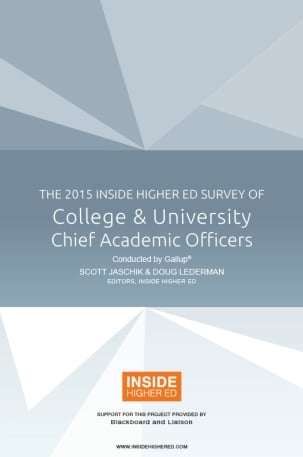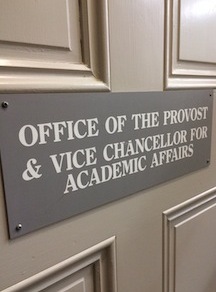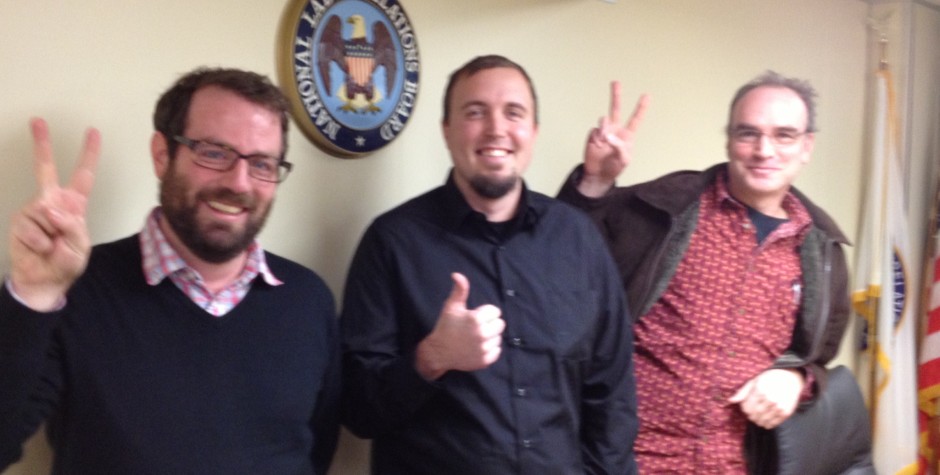Free Download

A majority of provosts are concerned about declining faculty civility in American higher education. And a large majority of provosts believe that civility is a legitimate criterion in hiring and evaluating faculty members. Generally, the provosts are confident that faculty members show civility in their treatment of students, but have mixed views on whether professors show civility in dealings with colleagues and doubt how much civility is shown to administrators.
These results are clear from Inside Higher Ed's 2015 Survey of College and University Chief Academic Officers. And after a year of intense debate over civility, the survey shows that provosts are not aligned with faculty leaders on the issue.
Other key findings:
- Many provosts report that their institutions are not feeling the impact of the widely reported improved economy. Most do not feel their institutions are operating in an improved financial situation, and many anticipate further budget cuts and paying for new initiatives through reallocations, not new funds.
- The idea of competency-based education is now attracting strong support from chief academic officers, especially in public higher education.
- Almost all chief academic officers believe that their institutions are very or somewhat effective at providing a good undergraduate education, and a little more than half think they are very effective at preparing students for the world of work. (That latter finding would appear to put the provosts at odds with employers in other surveys.)
- Provosts believe that sexual harassment is a serious problem in higher education in general, but are less likely to view this as the case at their own institutions.
- Most provosts expect to continue to rely on non-tenure-track faculty members and are skeptical that unionizing will lead to substantial changes in adjunct pay and working conditions. But provosts at public colleges and universities (who are more likely to operate on campuses with collective bargaining) see more potential for gains for adjuncts than do private college provosts.
The results are from a survey developed by Inside Higher Ed editors in consultation with Gallup, which managed the data collection. Responses were collected from 624 provosts or officials with equivalent titles, such as vice president for academic affairs.
Respondents were given complete anonymity, but results were coded by institution so that -- in some cases -- results can be broken down by sector.
The full survey booklet may be downloaded here.
The Civility Debates
Civility became the topic of heated debate in 2014. First, the University of Illinois at Urbana-Champaign blocked the hiring of Steven Salaita -- known for his intense criticism of Israel -- to teach American Indian studies. Statements from university leaders focused not on his research or teaching, but on his public statements and whether they had a tone that could make some students feel unwelcome.
About the Survey
Inside Higher Ed's 2015 Survey of College and University Chief Academic Officers was conducted in conjunction with researchers from Gallup.
Inside Higher Ed regularly surveys key higher ed professionals on a range of topics.
On Feb. 11 at 2 p.m. Eastern, Inside Higher Ed Editors Scott Jaschik and Doug Lederman will share and analyze the findings and answer readers' questions in a free webinar. To register, please click here.
The Inside Higher Ed survey of provosts was made possible in part by advertising from Academic Partnerships and Liaison International.
While university leaders later stressed that they were not imposing a civility test on hiring or promotion, many faculty leaders said they worried that the issue of civility could be used to block the hiring or promotion of many with unpopular views.
Other university leaders, such as Nicholas Dirks, chancellor of the University of California at Berkeley, also spoke out in defense of the value of civility in academe. And they too faced some criticism from faculty members.
Generally, provosts expressed concern (with little difference by sector) about civility. Asked if they were worried about "declining civility among higher education faculty," 27 percent said that they were very concerned and 44 percent were somewhat concerned. Only 5 percent were not concerned at all.
But in more detailed questions, provosts had varying perspectives on where faculty civility is lacking.
Generally, they feel more confident of faculty civility with regard to students than to fellow professors or (in particular) administrators. And provosts typically believe that their institutions display more civility than higher education as a whole. (A pattern in Inside Higher Ed surveys of administrators is that they think their institutions are doing better in many respects than the rest of higher education.)
How Provosts View Civility on Their Campuses
| Statement | Always | A Great Deal | Somewhat | Not at All |
| Faculty members practice civility in treatment of students at your institution. | 12% | 74% | 13% | 0% |
| Faculty members practice civility in treatment of students in higher education generally. | 4% | 57% | 39% | 0% |
| Faculty members practice civility in treating fellow faculty members at your institution. | 6% | 61% | 32% | 2% |
| Faculty members practice civility in treating fellow faculty members in higher education. | 2% | 44% | 52% | 1% |
| Faculty members practice civility in treating administrators at your institution. | 3% | 49% | 43% | 6% |
| Faculty members practice civility in treating administrators in higher education. | 1% | 25% | 67% | 7% |
Perhaps of greater concern to those who do not want civility considered in faculty hiring and promotion is that provosts think it should be considered, and that it does not raise issues of academic freedom.
Asked if civility is a legitimate criterion to consider in making faculty hiring decisions, 45 percent of provosts strongly agree and 39 percent agree. Asked if civility is a legitimate criterion in evaluating faculty members, 41 percent strongly agree and 42 percent agree.
 Many faculty leaders have said that considering civility in these cases can violate academic freedom, in that it can be used to justify not hiring or not awarding tenure to someone whose views are unpopular or who is pushing new ways of thinking about a discipline. But when the provosts were asked about whether the discussion of civility raised issues of academic freedom, only 2 percent said "always" and 16 percent said "a great deal."
Many faculty leaders have said that considering civility in these cases can violate academic freedom, in that it can be used to justify not hiring or not awarding tenure to someone whose views are unpopular or who is pushing new ways of thinking about a discipline. But when the provosts were asked about whether the discussion of civility raised issues of academic freedom, only 2 percent said "always" and 16 percent said "a great deal."
Henry Reichman, chair of the American Association of University Professors Committee on Academic Freedom and Tenure, who teaches history at California State University at East Bay, said he was concerned that so many provosts embrace civility as a hiring or promotion factor.
Reichman stressed that "certainly civil behavior is generally desirable, but it's unfortunate that provosts would believe that such an ill-defined concept as civility would be a legitimate criterion in hiring and promotion decisions." He asked: "Who defines what is civil and what is not? And how much of a factor should this be and when should it come into play?"
Reichman said that the AAUP believes that "the only legitimate criteria for promotion and hiring must relate directly and specifically to teaching, research, and service."
As to whether civility is in decline among faculty, Reichman said that "I haven't the faintest idea" and that there is "no meaningful way" to figure that out.
Given all the conflict between administrators and faculty members on many campuses, he said he was "not surprised" that administrators feel that faculty members are "increasingly uncivil in their relations." But he added: "I suspect that if you surveyed faculty members, they would also find the same to be true of administrators."
Sexual Harassment by and of Faculty
Provosts at many campuses in the last year have also faced questions over policies on sexual harassment. Prominent universities have been accused of ignoring harassment issues.
Here as well, provosts seem more likely to view harassment as a serious problem in higher education broadly than at their own institutions.
Five percent of provosts believe that sexual harassment of students by faculty members is a very serious issue at their institution, while another 17 percent rate the problem as serious. But asked about higher education as a whole, and the numbers jump to 12 percent for very serious and 52 percent for serious.
Similarly, only 12 percent of provosts believe that harassment of junior female faculty members by senior male faculty members is a very serious (3 percent) or serious (9 percent) problem at their institutions. For higher education in general, the numbers rise to 8 percent for very serious and 48 percent for serious.
More (Public) Support for Competency-Based Education
In recent years, more colleges -- with the encouragement of federal and state officials -- have pushed to start offering competency-based programs. In these programs, students are evaluated and awarded credit by demonstrating competency, not through traditional measures such as seat time. While some institutions -- think Western Governors University or Southern New Hampshire University -- are particularly well-known in this area, the idea has spread and is popping up at elite research universities such as the University of Michigan.
In last year's survey of provosts, it appeared that the chief academic leaders of public institutions were more open to the idea than were their counterparts at private institutions. And that seems to be true, perhaps to an even greater degree, this year.
In 2014, 62 percent of provosts at public institutions said they agreed or strongly agreed it should be easier for students to earn degrees through competency than is the case today. In 2015, that share increased to 65 percent. Among private institution provosts, 54 percent agreed in 2014, a level that dropped to 49 percent this year.
A major concern of some critics of competency education has been whether the approach works well for general education. Here, the percentage of provosts expressing such fears fell significantly, although a public-private gap remains. Last year, asked if they thought that competency-based education would be damaging to general education, 39 percent of public university provosts and 50 percent of private college provosts agreed or strongly agreed. This year the share was just 29 percent in public higher education and 42 percent in private higher education.
Economic Recovery for Some
Statistics abound showing that the economic situation in the country is better than it has been in some time, although part of the improvement has to do with how badly the United States economy was performing in 2008 and 2009. In higher education, statistics released this week show healthy increases in state appropriations nationally, but with much of the improvement concentrated in a small number of states.
The dynamic is evident in how provosts view their institutions' economic situation. Here, officials at private institutions seem to be feeling better off than the publics. Asked to respond to the statement that the economic downturn is "effectively over at my institution," 38 percent of provosts at private institutions agreed, compared to only 25 percent at public institutions. And asked if the financial situation of their institution had improved in the last year, 47 percent of private institution provosts agreed, compared to 35 percent in the public sector.
And even if things are better at many institutions, many provosts continue to predict tough choices (and in some cases more cuts) at their institutions:
- Two-thirds of provosts agreed or strongly agreed that funds for new academic programs would have to come from reallocation, not new revenues. (There was a public-private gap in responses, with 73 percent of public higher education provosts agreeing or strongly agreeing, compared to 61 percent in the private sector).
- 24 percent of provosts at public colleges and universities expect to reduce the number of academic programs by the end of the 2014-15 academic year. Only 18 percent of private college provosts have that expectation.
Grading Themselves
Nationally, there is a drumbeat of criticism about higher education from politicians and pundits. Provosts generally think their institutions are doing well.
Asked to rank the quality of undergraduate education, 74 percent of public college provosts said their institutions were very effective, 25 percent said somewhat effective and 1 percent not so effective. Among private college provosts, the numbers were similar: 76 percent very effective, 23 percent somewhat effective -- with 1 percent of provosts at private institutions saying that their institution was not effective at all.
While the overall grades provosts give their institutions are the equivalent of As, they give themselves the equivalent of Bs (and some even go below that) in some aspects of undergraduate education. And considering the criticism of colleges over issues such as controlling costs and preparing students for jobs, the positive evaluations may surprise some people.
For example, a study by the Association of American Colleges and Universities, released this week, found that undergraduates think they have the skills employers need, but that employers don't agree. But the data below show that provosts think their institutions are doing well at preparing students for careers.
And while many colleges and universities of course have proud records in the categories below, it is striking how rare it was for provosts to say some function was not effective.
How Provosts Rate Their Institutions on Undergraduate Education
| Function | Public | Private |
| Preparing students for world of work | ||
| --Very effective | 53% | 55% |
| --Somewhat effective | 44% | 43% |
| --Not too effective | 3% | 1% |
| --Not effective at all | 0% | 0% |
| Identifying and assessing student outcomes | ||
| --Very effective | 26% | 31% |
| --Somewhat effective | 62% | 60% |
| --Not too effective | 11% | 8% |
| --Not effective at all | 1% | 1% |
| Controlling rising costs | ||
| --Very effective | 40% | 24% |
| --Somewhat effective | 53% | 48% |
| --Not too effective | 12% | 21% |
| --Not effective at all | 1% | 1% |
| Preparing students for engaged citizenship | ||
| --Very effective | 26% | 52% |
| --Somewhat effective | 59% | 42% |
| --Not too effective | 14% | 6% |
| --Not effective at all | 1% | 0% |
| Undergraduate support services | ||
| --Very effective | 49% | 53% |
| --Somewhat effective | 47% | 40% |
| --Not too effective | 4% | 5% |
| --Not effective at all | 0% | 1% |
| Using data to aid and inform decision-making | ||
| --Very effective | 33% | 30% |
| --Somewhat effective | 57% | 59% |
| --Not too effective | 10% | 11% |
| --Not effective at all | 1% | 0% |
Reliant on Adjuncts and Dubious of Unions
Provosts continue to be aware of their reliance on non-tenure-track faculty members, and most do not anticipate much change in the pattern -- despite widespread criticism of the way colleges treat their adjuncts. In responses that were similar to those of a year ago, 74 percent of public college provosts and 62 percent of private college provosts said that their institution relies "significantly" on faculty who are off the tenure track.
Two-thirds of the provosts (public and private) anticipate that, in the future, they will remain about as reliant on non-tenure-track faculty as they are now. And of the one-third who anticipate a change, twice as many provosts believe their institutions will become more reliant on adjuncts as believe their institutions will become less reliant.
 In response to a sense that higher education isn't willing to change its treatment of adjuncts, an increasing number have turned to collective bargaining -- generally against the wishes of administrators. At right, a photo of adjuncts celebrating a vote to unionize at Washington University in St. Louis.
In response to a sense that higher education isn't willing to change its treatment of adjuncts, an increasing number have turned to collective bargaining -- generally against the wishes of administrators. At right, a photo of adjuncts celebrating a vote to unionize at Washington University in St. Louis.
Past surveys by Inside Higher Ed of several groups of administrators have found significant skepticism of unions in higher education. So this year, Inside Higher Ed asked provosts if they expected that unions could help adjuncts in many ways. The results suggest that the opposition of administrators to adjunct unions is not because they expect them to make significant gains. Provosts at public colleges and universities (which generally have more experience with collective bargaining) are more likely than their private college counterparts to think that unions will make a difference.
The provosts are most skeptical of the ability of adjunct unions to win more job security for their members.
Provosts' Views on Adjunct Unions
| Statement | Agree/Strongly Agree -- Public | Agree/Strongly Agree -- Private |
| Unionizing will help adjuncts win better pay. | 30% | 20% |
| Unionizing will help adjuncts win better benefits. | 31% | 22% |
| Unionizing will improve job security for adjuncts | 20% | 14% |